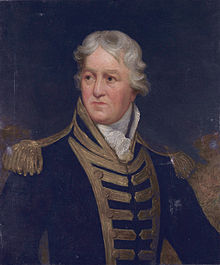Charles Middleton, 1st Baron Barham
| The Lord Barham | |
|---|---|

Admiral Charles Middleton, later Lord Barham (Isaac Pocock)
|
|
| Born | 14 October 1726 Leith, Midlothian, Scotland |
| Died | 17 June 1813 (aged 86) Barham Court, Teston, Kent, England, UK |
| Allegiance |
|
| Service/branch |
|
| Years of service | 1741–1813 |
| Rank | Admiral |
| Battles/wars |
Seven Years' War American War of Independence French Revolutionary Wars Napoleonic Wars |
| Other work | abolitionist |
Admiral Charles Middleton, 1st Baron Barham PC (14 October 1726 – 17 June 1813) was a British naval officer and politician.
He was born at Leith, Midlothian to Robert Middleton, a customs collector of Bo'ness, Linlithgowshire, and Helen, daughter of Captain Charles Dundas RN and granddaughter of Sir James Dundas of Arniston. He was a nephew of Brigadier-General John Middleton (1678–1739), a grandson of George Middleton DD, and a great-grandson of Alexander Middleton (younger brother of John Middleton, 1st Earl of Middleton), the last two having served as Principal of King's College, Aberdeen.
Middleton entered the Royal Navy in 1741 as captain's servant aboard HMS Sandwich and HMS Duke, and later served aboard HMS Flamborough as midshipman and master's mate. He became lieutenant in 1745, serving aboard the frigate HMS Chesterfield, after 1748 on the west Africa station.
During the Seven Years' War, from 1754, Middleton was stationed aboard HMS Anson during her apprehension and capture of two French ships at Louisbourg, after which he was stationed in the Leeward Islands. In January 1757, an incident over rum rations, during which Middleton lost his temper and physically attacked a sailor ended with the sailor being court martialled and Middleton being transferred and promoted to command of the sloop HMS Speaker.
...
Wikipedia
